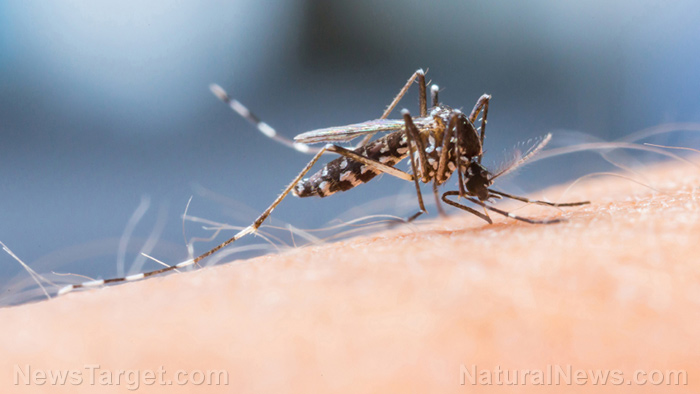Here’s the science on why you’re a mosquito magnet (plus some natural ways to keep them at bay)
08/26/2019 / By Melissa Smith

Female mosquitoes rely on sensory information to find their food source – human blood. They pick up on body odor, carbon dioxide, heat, moisture, and visual cues. A new study published in the journal Current Biology now discovered that a specific odor receptor in their antennae also serves as a detector of humans, picking up on chemicals found in human sweat. This unique odor receptor is known as Ionotropic Receptor 8a (IR8a). It is used by female mosquitoes, particularly the Aedes aegypti species, to detect lactic acid.
The researchers, who were from Florida International University, also found mosquitoes lacking a functional version of the IR8a gene were much less attracted to humans. They suggested that odors that can mask the IR8a pathway could improve the efficacy of mosquito repellents. This pathway could also be used to make new mosquito attractants that could lure mosquitoes away from people and attract them into traps instead.
How the study was carried out
For this study, the researchers looked at IR8a, which is expressed in the antenna of mosquitoes. They used the CRISPR-Cas9 gene-editing system to block the activity of Ir8a in A. aegypti mosquitoes. Then, they conducted various lab tests to see if disrupting this receptor would make mosquitoes less attracted to humans.
The team asked people to put their hands into a device called olfactometer and let mosquitoes smell them from afar. Captive mosquitoes could fly through the device to get close, but not close enough to bite the participants. The results showed that disabling IR8a made the mosquitoes significantly less interested to fly toward the humans’ skin.
Get CLEAN FOOD and help support our mission to keep you informed: The Health Ranger Store lab verifies everything we sell with accredited testing for heavy metals, microbiology and food safety. Certified organic facility, ISO-accredited on-site laboratory, no GMOs or synthetic ingredients. The world's #1 source of lab-verified clean foods and superfoods for nutritional healing. 600+ products available. Explore now.
In addition, to prove that it was a response to smell that was being affected, the researchers also asked the participants to wear nylon sleeves for nearly 12 hours to collect sweat. Then, they put these sweat-drenched sleeves into the olfactometer. Similarly, the mutant mosquitoes were less enticed to the scent than normal mosquitoes were. A. aegypti mosquitoes transmit diseases such as dengue, yellow fever, and Zika. The researchers suggested that the transmission of these diseases can be stopped if there is a way to stop mosquitoes from biting humans in the first place.
Natural mosquito repellents
You can protect yourself against mosquitoes without having to use a DEET-based chemical repellent. Such products are harmful to your health and the environment. (Related: How toxic is DEET? Zika virus less harmful than the insect repellent ‘fighting’ it.)
Here are several safe and natural mosquito repellents you can make at home:
- Lemon eucalyptus oil – Mix one-part lemon eucalyptus oil with 10 parts sunflower oil or witch hazel. The Centers for Disease Control and Prevention (CDC) has approved eucalyptus oil as an effective ingredient in mosquito repellents.
- Lavender – When crushed, lavender flowers produce a fragrance and oil that can repel mosquitoes. You can apply crushed lavender flowers or lavender essential oil to your arms, ankles, and other bite-sensitive areas of the body. Lavender can also calm and soothe your skin.
- Thyme oil – You can make a spray mosquito repellent with thyme oil. Just mix five drops of thyme oil with two ounces of water. If you’re out in the woods, you may also throw thyme leaves into a campfire to prevent malarial mosquitoes from biting you.
Read more stories on how to protect yourself from mosquitoes naturally at Remedies.news.
Sources include:
Tagged Under: aedes aegypti, dengue, infectious diseases, insect repellents, IR8a, Malaria, mosquito bites, mosquito repellents, mosquitoes, odor, remedies, research, smell



















